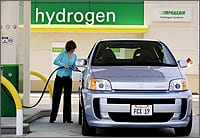Scotland publishes new roadmap concerning hydrogen fuel and transportation
September 19, 2013New analysis focuses on hydrogen fuel and clean transportation
The Scottish government has published a new analysis of the use of hydrogen fuel and fuel cell technology in the country. The analysis is called “Switched On Scotland: A Roadmap to Widespread Adoption of Plug-in Vehicles.” As the name suggests, the analysis focuses on the use of hydrogen fuel in transportation and the viability of hydrogen-powered and hybrid vehicles. The analysis provides an outline of how the country aims to pursue hydrogen fuel through 2050.
Scotland aims to be emission free by 2050
By 2050, Scotland aims to be emissions free. This is to be accomplished through the use of various forms of renewable energy, which will replace fossil-fuels in the country in the coming years. Transportation is associated with a significant level of emissions in the country and has become a target for Scotland. Hydrogen fuel cells are gaining more attention because they can be used to power vehicles. These energy systems are able to produce electrical power without also producing any harmful emissions.
 Cost of fossil-fuels spurs interest in alternatives
Cost of fossil-fuels spurs interest in alternatives
The analysis does highlight some of the economic benefits that could be attained through the adoption of hydrogen fuel in the transportation sector. Currently, the majority of the fuel that Scotland uses to power transportation comes from foreign countries. This is a significant financial investment for the country, especially as political tensions around the world cause the price of this fuel to grow.
Roadmap highlights challenges facing hydrogen fuel adoption
The analysis also takes note of the challenges that exist in introducing hydrogen fuel to the transportation world. The infrastructure needed to support hydrogen-powered vehicles is currently lacking, making it difficult for consumers to justify the adoption of these vehicles. Moreover, fuel cells are notoriously expensive, which means that the vehicles that make use of them will also be expensive. For many consumers, the cost of fuel cells is enough to keep them away from hydrogen-powered vehicles.

 With over 15 years of reporting hydrogen news, we are your premier source for the latest updates and insights in hydrogen and renewable energy.
With over 15 years of reporting hydrogen news, we are your premier source for the latest updates and insights in hydrogen and renewable energy.